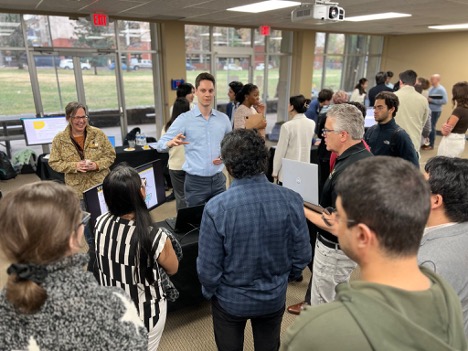Vanderbilt University’s AI Showcase, a recent event hosted by the Data Science Institute, highlighted the remarkable convergence of innovation, inclusivity and practical problem-solving through student-led data science projects. The showcase, structured like a research fair, hosted an array of student presentations, each competing for a part of a $1,700 prize pool. “Students throughout the university are embracing generative AI to breathe life into their ideas. They’re solving difficult problems and actively forging a future that aligns with their values for a world where every voice is heard and valued,” said Charreau Bell, senior data scientist and director of the undergraduate minor in data science.
First-place winner Liv Lockwood, a junior majoring in human and organizational development and minoring in data science, demonstrated values-based innovation with her “ASL Translator.” Lockwood explained, “in a nutshell, my project teaches people how to communicate sentences, phrases and names in American Sign Language quickly and easily by communicating with a friendly chatbot. Not only does the tool teach communication, but also explains the history and importance of Deaf culture and history while teaching you.” Lockwood said her inspiration for the project came in part from her younger brother, through whom she has spent considerable time interacting with the special needs and education community. She also acknowledged the support she received from Jesse Spencer-Smith, her professor for Introduction to Generative AI. Lockwood credits generative AI with helping her realize her vision without significant hard coding skills and reports that she was delighted to help demonstrate that “if time and resources are given to technological developments in the education community and to promoting tools for inclusivity, we can rapidly increase how comprehensive our world is.”
Shalini Thinakaran, also a junior, majoring in computer science and Latin American studies, also minoring in data science, captured second place with “AI for All,” a project that she says “was about centering marginalized identities in AI.” Thinakaran says she set out to “fine-tune a machine learning model using literature that has shaped our understanding of power dynamics in society. Examples include works from people like Angela Davis, James Baldwin and Audre Lorde. By focusing on readings that emphasize the unjust ways in which marginalized communities are affected, we can begin to create technologies that serve all of us.”
The event also featured other AI-driven innovations, such as advanced educational tools, medical diagnostic applications, and platforms for emotional well-being. These diverse projects collectively highlighted the broad spectrum of data science applications in practical problem-solving. Third place went to Daniel Han, who graduated in December 2023 with a degree in mathematics and minors in data science, psychology and scientific computing, for his “NarrativeNet AI.” His project applied AI in understanding social networks through narrative data, offering innovative ways to decipher complex social structures. Notably, one winner’s project fulfilled the university’s Immersion Vanderbilt requirement, which ensures that all undergraduates engage in one or more experiential learning activities related to research, internships, study abroad, community and civic engagement, innovation and design, or creative arts.

The AI Showcase was a testament to the power of combining data science with innovative thinking and a commitment to inclusivity. It not only demonstrated the students’ technical skills learned through data science courses, but also their dedication to using their skills for the greater good, preparing them to be forward-thinking problem-solvers in a technologically evolving world.
The Data Science Institute hosts a variety of events to educate the Vanderbilt community about AI. Join them for an AI Training Day on Custom Models on March 5 at the VU Student Life Center. This daylong, hybrid event combines comprehensive insights into the development of new AI models with a focus on the practicalities of custom model training to equip researchers, educators and practitioners to navigate the rapidly evolving AI landscape. .